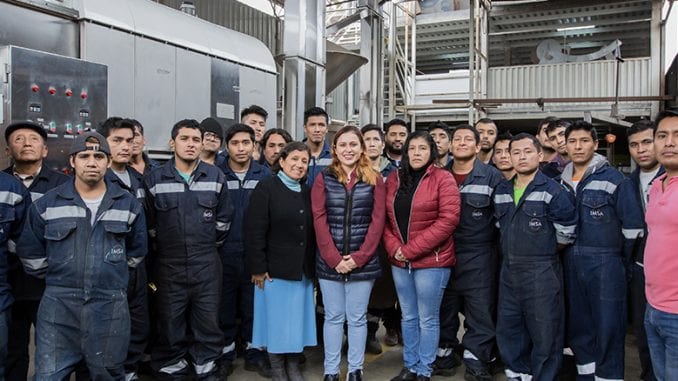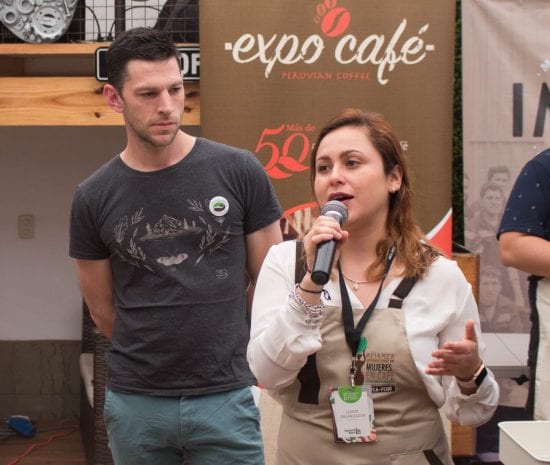
We close our interview with Peru’s Anggela Sara Garcia, who founded Espressate Mujer and the Specialty Coffee Community.
BY VALORIE CLARK
SPECIAL TO BARISTA MAGAZINE ONLINE
Cover photo by Nathalie Sayago
From the editor: Last week, we began a conversation with Anggela Sara Garcia from Peru, and learned how she founded several coffee organizations in the country. Today we get her take on what the country needs to do to improve its specialty coffee. This interview has been translated from Spanish. It was edited and condensed for clarity.

In the first part of the interview, we discussed some of the problems facing Peru’s coffee community, including low prices and climate change. How does the Specialty Coffee Community—the group you created to explore coffee in Peru—help solve those problems?
The Specialty Coffee Community arose from a group of friends who shared very good coffees and who always wondered what we could do to get more people to these. We started by putting together free public tastings. At first we thought that it would continue to be just us, that at most our family would accompany us. Because, let’s be honest, for most people cupping is not the most fun part of the process. Between sips and spit, it scares some people, and even more so with the tables and everyone describing flavors and giving “poems” about them. We think that these tastings will be more “light.” We comply with the initial protocol, weights, temperatures and all that, but for the tasting itself, we do it without tables, just passing and testing, remembering what we are trying and then talking about what we find. We guide each other, resulting in an audience amazed by the sensations experienced and wanting more. We’ve already done 25 public tastings!
Now, after these 25 tastings, we see that many local coffee shops and brands start to make their own sensory events and tastings for their target audience, which shows us that we were able to contribute something.
But we wanted to go further. People needed to see where these coffee came from, to know truly that “the coffee doesn’t just happen.” We started with the “Travel to Origin” trip, where we knew the farms, the processes, and the producers told us their experiences, their day-to-day. The participants could interact with the producers, get to know their reality, then we ended the trip with a tasting of the coffees of the farms visited.
What led you to create the Espressate Mujer barista championship?
I am a founding member of the Peru Chapter of the International Women Coffee Alliance (IWCA).
As part of our goal of empowering coffee women, IWCA holds events, one of which was the All Star Female Barista 2017, which was held in Puebla, Mexico. They advised that we contact the organizers of the Barista championship in our country so that the female participant who had occupied the highest place or is the champion in the last edition was our representative.
But by May 2017 in Peru, a championship had not been held in four years! It seemed totally crazy to me that this is the situation in our country, so I proposed to our Board of Directors that we organize a championship. How hard can it be, I thought. Fabiola Ugarte [also with IWCA] joined me, and between the two of us we discovered that it was a huge challenge! But we were totally willing to do it. We found a community willing to help us—someone lent us a cafetería for development, the necessary sponsorships arrived to be able to fulfill bringing our champion to Mexico, prizes for the other contestants, and all this without giving us a dollar! It was beautiful! The reception, the quality, and level of the participants, uff! We decided to modify the Author Drink rule: It does not have to be based on espresso, it had to be Espressate Woman, which is a play on Spanish words, meaning espresso drink and express, the verb.
We already had the second edition in 2019, which was much bigger. We even had Dale Harris, World Barista Champion, there to help us! It was beautiful! And thanks to Espressate Woman, I started my time in the world of championships, and have now been a judge of the national championships.
What are you most excited to see happen in the coffee community in Peru?
The desire for things to change, the role that women are taking throughout the chain, from the countryside to the industry, making our voices heard. It excites me to see how more and more people want to learn, to professionalize the sector. I see the constant growth of the entire chain: Producers wanting to innovate in their fields. Roasters that pay competitive prices, so that we can also get these coffees in a local market while taking full care and respect to give us the best version of them. Baristas committed to bringing to the consumer not just a cup but an experience. With patience and a lot of work, this whole community is coming together, because it is tired of the guilds and waiting for things to change. Coffee never ceases to amaze me for a single day: It challenges me, it pushes me, and sometimes it even gives me headaches. But there we are, looking for the way out, to grow in community and, of course, eventually, as a country.

ABOUT THE AUTHOR
Valorie Clark (@TheValorieClark) is a freelance writer with a background in specialty coffee. She is based in Los Angeles.

